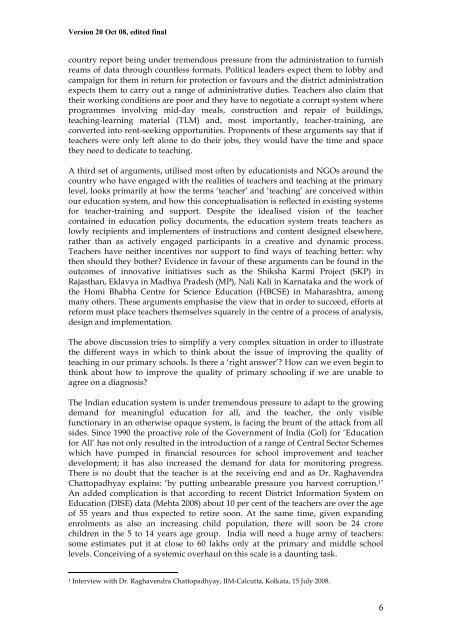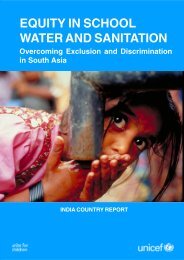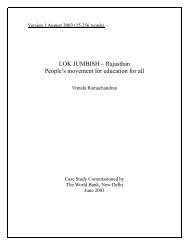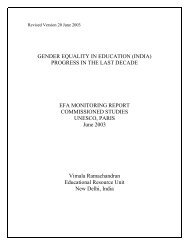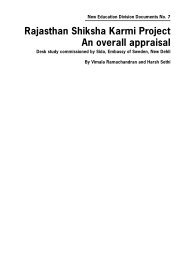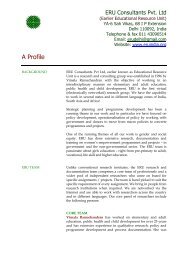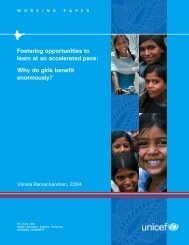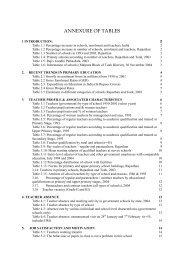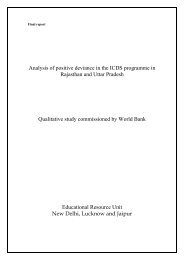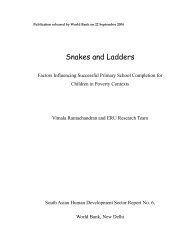primary school teachers the twists and turns of everyday practice
primary school teachers the twists and turns of everyday practice
primary school teachers the twists and turns of everyday practice
You also want an ePaper? Increase the reach of your titles
YUMPU automatically turns print PDFs into web optimized ePapers that Google loves.
Version 20 Oct 08, edited final<br />
country report being under tremendous pressure from <strong>the</strong> administration to furnish<br />
reams <strong>of</strong> data through countless formats. Political leaders expect <strong>the</strong>m to lobby <strong>and</strong><br />
campaign for <strong>the</strong>m in return for protection or favours <strong>and</strong> <strong>the</strong> district administration<br />
expects <strong>the</strong>m to carry out a range <strong>of</strong> administrative duties. Teachers also claim that<br />
<strong>the</strong>ir working conditions are poor <strong>and</strong> <strong>the</strong>y have to negotiate a corrupt system where<br />
programmes involving mid-day meals, construction <strong>and</strong> repair <strong>of</strong> buildings,<br />
teaching-learning material (TLM) <strong>and</strong>, most importantly, teacher-training, are<br />
converted into rent-seeking opportunities. Proponents <strong>of</strong> <strong>the</strong>se arguments say that if<br />
<strong>teachers</strong> were only left alone to do <strong>the</strong>ir jobs, <strong>the</strong>y would have <strong>the</strong> time <strong>and</strong> space<br />
<strong>the</strong>y need to dedicate to teaching.<br />
A third set <strong>of</strong> arguments, utilised most <strong>of</strong>ten by educationists <strong>and</strong> NGOs around <strong>the</strong><br />
country who have engaged with <strong>the</strong> realities <strong>of</strong> <strong>teachers</strong> <strong>and</strong> teaching at <strong>the</strong> <strong>primary</strong><br />
level, looks primarily at how <strong>the</strong> terms ‘teacher’ <strong>and</strong> ‘teaching’ are conceived within<br />
our education system, <strong>and</strong> how this conceptualisation is reflected in existing systems<br />
for teacher-training <strong>and</strong> support. Despite <strong>the</strong> idealised vision <strong>of</strong> <strong>the</strong> teacher<br />
contained in education policy documents, <strong>the</strong> education system treats <strong>teachers</strong> as<br />
lowly recipients <strong>and</strong> implementers <strong>of</strong> instructions <strong>and</strong> content designed elsewhere,<br />
ra<strong>the</strong>r than as actively engaged participants in a creative <strong>and</strong> dynamic process.<br />
Teachers have nei<strong>the</strong>r incentives nor support to find ways <strong>of</strong> teaching better: why<br />
<strong>the</strong>n should <strong>the</strong>y bo<strong>the</strong>r? Evidence in favour <strong>of</strong> <strong>the</strong>se arguments can be found in <strong>the</strong><br />
outcomes <strong>of</strong> innovative initiatives such as <strong>the</strong> Shiksha Karmi Project (SKP) in<br />
Rajasthan, Eklavya in Madhya Pradesh (MP), Nali Kali in Karnataka <strong>and</strong> <strong>the</strong> work <strong>of</strong><br />
<strong>the</strong> Homi Bhabha Centre for Science Education (HBCSE) in Maharashtra, among<br />
many o<strong>the</strong>rs. These arguments emphasise <strong>the</strong> view that in order to succeed, efforts at<br />
reform must place <strong>teachers</strong> <strong>the</strong>mselves squarely in <strong>the</strong> centre <strong>of</strong> a process <strong>of</strong> analysis,<br />
design <strong>and</strong> implementation.<br />
The above discussion tries to simplify a very complex situation in order to illustrate<br />
<strong>the</strong> different ways in which to think about <strong>the</strong> issue <strong>of</strong> improving <strong>the</strong> quality <strong>of</strong><br />
teaching in our <strong>primary</strong> <strong>school</strong>s. Is <strong>the</strong>re a ‘right answer’? How can we even begin to<br />
think about how to improve <strong>the</strong> quality <strong>of</strong> <strong>primary</strong> <strong>school</strong>ing if we are unable to<br />
agree on a diagnosis?<br />
The Indian education system is under tremendous pressure to adapt to <strong>the</strong> growing<br />
dem<strong>and</strong> for meaningful education for all, <strong>and</strong> <strong>the</strong> teacher, <strong>the</strong> only visible<br />
functionary in an o<strong>the</strong>rwise opaque system, is facing <strong>the</strong> brunt <strong>of</strong> <strong>the</strong> attack from all<br />
sides. Since 1990 <strong>the</strong> proactive role <strong>of</strong> <strong>the</strong> Government <strong>of</strong> India (GoI) for ‘Education<br />
for All’ has not only resulted in <strong>the</strong> introduction <strong>of</strong> a range <strong>of</strong> Central Sector Schemes<br />
which have pumped in financial resources for <strong>school</strong> improvement <strong>and</strong> teacher<br />
development; it has also increased <strong>the</strong> dem<strong>and</strong> for data for monitoring progress.<br />
There is no doubt that <strong>the</strong> teacher is at <strong>the</strong> receiving end <strong>and</strong> as Dr. Raghavendra<br />
Chattopadhyay explains: ‘by putting unbearable pressure you harvest corruption. 1 ’<br />
An added complication is that according to recent District Information System on<br />
Education (DISE) data (Mehta 2008) about 10 per cent <strong>of</strong> <strong>the</strong> <strong>teachers</strong> are over <strong>the</strong> age<br />
<strong>of</strong> 55 years <strong>and</strong> thus expected to retire soon. At <strong>the</strong> same time, given exp<strong>and</strong>ing<br />
enrolments as also an increasing child population, <strong>the</strong>re will soon be 24 crore<br />
children in <strong>the</strong> 5 to 14 years age group. India will need a huge army <strong>of</strong> <strong>teachers</strong>:<br />
some estimates put it at close to 60 lakhs only at <strong>the</strong> <strong>primary</strong> <strong>and</strong> middle <strong>school</strong><br />
levels. Conceiving <strong>of</strong> a systemic overhaul on this scale is a daunting task.<br />
1 Interview with Dr. Raghavendra Chattopadhyay, IIM-Calcutta, Kolkata, 15 July 2008.<br />
6


